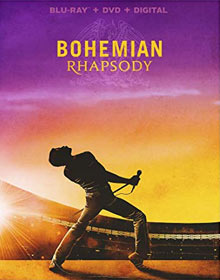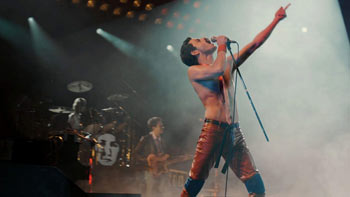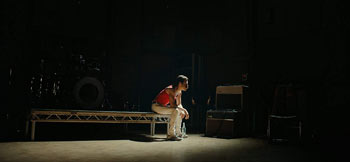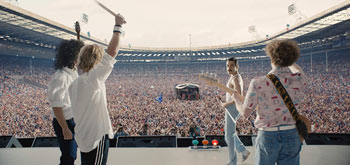

 - for thematic elements, suggestive material, drug content and language.
- for thematic elements, suggestive material, drug content and language.
A chronicle of the years leading up to Queen's legendary appearance at the Live Aid (1985) concert. (from IMDB)
There's the usual (sometimes extraordinary) biopic, and then there's the musical biopic, which seems to be a much different animal. But with any of these biographical films, in the effort to make a film that's interesting and entertaining, the truth can get a little murky along the way. This may not be problematic to casual viewers, but for those who really want to learn about the film's subject, it can be a big problem when too many "artistic liberties" are taken, compromising historical accuracy.

Perhaps filmmakers just figure those who care about fact over fiction would watch a documentary or spend some time reading up on the history of their film's subject. But just like any book that is translated to film undergoes creative changes, so often does the translation of one's life into a feature film.
Bohemian Rhapsody isn't a film about the struggles and successes of Queen as much as it is a biopic about the band's talented and flamboyant frontman Freddie Mercury. And, honestly, that's kind of a shame, because the film glosses over and rushes through the creation of some of the band's most notable hits to give ample time to the loneliness and broken romantic pursuits of Mercury. In the end, you may wonder just what the film's true goal was?
To tell the rise, and eventual "fall," of Mercury, it seems vital to the story to at least touch on Mercury's sexuality. It's common knowledge that Freddie was gay, but as he's portrayed in the film, those who didn't know much about him (like this viewer), would be surprised to learn that he not only first pursued a woman named Mary, but he actually married her. So when the story does introduce his pursuits of the same sex, it's apparently when he starts cheating on her while the band is on the road and he's away from her. From the flirtatious glance of a burly truck driver, beckoning the singer to follow him into a truck stop bathroom, to the affairs and one night stands that would follow, there's an unsettling creepiness to all of this. Today's Hollywood has been pushing to normalize this kind of lifestyle, and you have to wonder about some of the true motives behind things portrayed in this movie. Granted, as a Freddie Mercury life story, it would be dishonest not to at least touch on this kind of subject matter, but there's something about the way this film portrays it that feels off - even gratuitous at times. Freddie is portrayed as being tempted or lured into this attraction a bit (and seems surrounded by an unusual number of closeted gay men), but on more than one occasion is the audience made to watch long, passionate kisses between Mercury and another man. Some would argue that it serves Freddie's story, and I suppose if making his sexuality such a focal point was indeed their goal, then they succeeded, but I personally was not interested at all in exploring this side of Mercury's life. Furthermore, every time they rushed through a hit-discovery session of Queen songwriting in the studio or on the road, I found myself wishing they'd lingered more THERE and not on other areas of Freddie's personal life.

And some of those songwriting sessions just didn't feel real. In the same moment they have a fight about something going on in Freddie's life, one of them is figuring out their next big, (really big) recognizable hit -- whether it's the baseline for "Another One Bites the Dust" or the foot stomps and crowd participation of "We Will Rock You." The film will show the seed for the song idea being planted and immediately rush by it to get back to Freddie's life behind closed doors. These song discovery moments were some of the film's most fun and smile-inducing scenes, but their rushed nature felt more staged and disingenuous. Let's face it - most viewers are filling the theater seats to see those scenes, not the salacious sexual life of Freddie Mercury. It's almost like the film itself is saying "Oh yeah, the band wrote this song, too - let's get back to examining Freddie's tortured soul!" It's these rushed musical scenes that rob the film of any reality and just make it feel like a fictional musical drama and not something that's supposed to represent a real group of people and the lives they led.
If there's one thing to be said about this film, however, it's that the acting displayed here is exceptional. Rami Malek goes to great lengths to portray Freddie - especially in his live performances - with such honesty and passion. Malek carries the film with great strength, and he clearly gave this performance everything he's got. (I will not be the least bit surprised if he gets an Oscar nomination... especially due to the film's subject matter.) The supporting cast is quite good, with his bandmates in Queen stealing the scenes they were featured in. (I loved seeing little "Timmy" from Jurassic Park all grown up here playing the band's bass player, John Deacon.) It really made me want to see more of the guys performing and interacting with each other every time they assembled. I really feel like the film was strongest when Queen was being... well, Queen. Lucy Boynton is lovely as Mary, and is especially likeable. It certainly adds to the drama between Freddie and her that she's such a sympathetic character (much unlike Johnny Cash's wife while he was running around with June Carter in Walk The Line). Boynton really makes you feel for her when Freddie goes astray. Most of the rest of the cast is pretty strong, but I have to admit that, while nearly unrecognizable as record exec Ray Foster, Mike Myers (of Shrek and Austin Powers fame) felt the most like a caricature of a character in the film (especially under all the fake facial hair). But that is a minor gripe in the grand scheme of the film's acting.
One of the film's greatest strengths was the recreation of the musical performances. To get the vocals as close to Freddie's as possible, they mixed Rami's voice at times with Freddie's original recordings and Canadian singer Marc Martel's. JFH readers may recognize Martel's name as having been the frontman of Christian pop rock band Downhere and, more recently, a solo artist who's even appeared on such circuits as K-LOVE's Christmas tour. Martel won a Queen Extravaganza contest several years ago and ended up fronting the Queen's official tribute band. To this day, Martel still records and performs some Queen songs (and even released a new Queen covers EP a week before this film released). Keen ears will recognize Martel's voice clearly at times during the film, but it's a unique approach to mix the three voices together here and there to bring Freddie back to life on the big screen.

The content of the film fits within the PG-13 branding, but it does push its appropriateness for the target audience due to its handling of the sexual content (although some will certainly consider it mild). The profanity isn't constant, but there's 1 "F" word from Freddie and a handful of "S" words, as well as a few really unnecessary inclusions of blasphemy. Freddie's drug usage is touched on but not focused on heavily, while characters are frequently seen drinking and smoking, with drinking even happening on stage (and at one point, someone pours beer on the drum kit so you can see it splashing up as the drummer hits it). Sexual content is the biggest red flag, however. We see Freddie and Mary in bed after obviously spending the night together, and we see her buttoning her shirt up as they talk (he's shirtless). Another scene shows her only having a blanket over herself as she sits on a couch (and he's without a shirt again) after they've spent time together. (We don't see any nudity, but the band even walks in and she covers herself up more and is annoyed.) When Freddie starts experimenting sexually, we see him get off the phone with his wife at a truck stop as a burly trucker shoots flirtatious glances at him. We then see him contemplating it as the man goes into the bathroom and looks over his shoulder at Freddie (the scene ends there). Another scene, while in the studio, shows Paul suddenly kiss Freddie, confessing his feelings for him, but Freddie rejects him. Later, we see Paul introducing Freddie to a young man and the next scene shows Freddie waking up in a robe while the young man is asleep on the couch in just briefs. Another scene shows a lonely Freddie inappropriately grabbing a male waiter's butt after a party, and the man angrily reprimands him. Freddie apologizes and says he just loves a man in uniform, to which the waiter agrees. The two then sit and talk, kiss passionately, and then the scene ends with him leaving. Finally, we see other parties where same-sex couples are making out in the background, and it's mentioned in conversation that Freddie has had many gay lovers, and we learn that he has contracted AIDS. Lastly, the only bloody content is a scene where Freddie coughs into a handkerchief and we see some bloody spots on it.
Bohemian Rhapsody is sadly one of those movies that reveals its weaknesses the more you think about it. I honestly walked out of the theater feeling a little violated while also feeling wowed by the musicality of the film. But as I dug into the history of the band a bit, learning about the historical inaccuracies of the story and thinking about how manipulative the story came across at times, I realized that some of the film's deepest criticisms were warranted. And while my criticisms of the story are probably different than a lot of mainstream critics, I think there will be plenty of viewers of faith who will be uncomfortable with what this film seems to be trying to say. Queen fans should appreciate large chunks of the film, but those who value historical storytelling of true events, and those who are more sensitive to the kind of life Freddie led, will want to exercise some caution when checking out the film Bohemian Rhapsody. (But if you're wondering how best to spend your hard-earned money wisely, I highly suggest picking up Marc Martel's new Queen covers EP, Thunderbolt and Lightning instead.)
- John DiBiase (reviewed: 11/5/18)
iTunes Exclusive: Thunderbolt and Lightning: Recording "Bohemian Rhapsody" (5:49) - This featurette is exclusively included with the iTunes digital copy of the film. It features real, surviving Queen members Roger Taylor and Bryan May who talk about what it was like to record the song "Bohemian Rhapsody" and how crazy and risky of a song it was, especially for its time. The actors also reflect on the song as well, and talk about how fans loved it even before it had been officially released.
The Complete Live Aid Movie Performance (21:55) - The climactic Live Aid concert featured at the end of the film--easily one of the best parts about the film--is featured in its uncut entirety here, as the production recreated the band's full 20-minute set for the movie. It's edited to fit into the film (with the cuts back to see Freddie's parents watching, for example), but it includes all of the songs.
Rami Malek: Becoming Freddie (16:13) - Actor Rami Malek talks about getting the role and studying everything about Freddie in preparation of playing him. The production team talks about him getting a movement coach, fitting him for prosthetic teeth and a piece to change the shape of the bridge of his nose, and the various flamboyant costumes Freddie would wear. They stressed--throughout all of the featurettes--that they knew these were actors playing real people, so they mainly aimed to capture the real person's essence, knowing they weren't going to be able to completely be the person they were playing.
The Look and Sound of Queen (21:44) features the actors and production team talking about the various wigs and clothes they got to wear, and talking to the real Bryan and Roger to get a feel for who they were playing. We also learn that some of the actors had little to no ability to play any instruments for real, so they had to learn in preparation for the film (like how Ben Hardy lied about being able to play drums, so he had to learn before filming began!). We also find out that Bryan and Roger lent the actors some of their original wardrobe pieces to wear on camera! (1 "S" word in a clip from the movie.)
Recreating Live Aid (19:56) - This is a very thorough look at how they recreated the physical stage for the iconic Live Aid performance. They had to find an open airfield in London to build the stage on, filmed the concert with a small batch of extras, and then filled out the audience digitally to match the look of the original stadium performance. They reveal how they filmed hundreds of extras clapping and singing along in front of a green screen, which they used to populate the audience digitally. It's pretty fascinating to see how they actually did this. It's also a real treat to see Bryan and Roger's emotional reaction to seeing the stage and how well it matched what they remembered (although it's a very brief moment here).
- John DiBiase, (reviewed: 2/10/19)
Disclaimer: All reviews are based solely on the opinions of the reviewer. Most reviews are rated on how the reviewer enjoyed the film overall, not exclusively on content. However, if the content really affects the reviewer's opinion and experience of the film, it will definitely affect the reviewer's overall rating.
 Casey J Drops First Album in 6 Years, "The Stories We Sing Vol. 1" Casey J Drops First Album in 6 Years, "The Stories We Sing Vol. 1"Thu, 05 Mar 2026 13:46:00 EST |
 The K-LOVE Fan Awards Returns to Nashville's Opry House May 24 The K-LOVE Fan Awards Returns to Nashville's Opry House May 24Thu, 05 Mar 2026 13:35:00 EST |
 StowTown Records Releases New Album "Rise and Shine" from Sunday Drive StowTown Records Releases New Album "Rise and Shine" from Sunday DriveThu, 05 Mar 2026 13:12:00 EST |
 Mat Kearney Announces "Nothing Left To Lose" 20th Anniversary Tour Mat Kearney Announces "Nothing Left To Lose" 20th Anniversary TourWed, 04 Mar 2026 19:10:00 EST |
 We The Kingdom Celebrates RIAA Gold Certification of "God So Loved" We The Kingdom Celebrates RIAA Gold Certification of "God So Loved"Tue, 03 Mar 2026 18:40:00 EST |
 Mary-Clair Attends Lionsgate's "I Can Only Imagine 2" Premiere Mary-Clair Attends Lionsgate's "I Can Only Imagine 2" PremiereTue, 03 Mar 2026 18:30:00 EST |
 Stand41TrueGod to Release New Single "Wilderness" on All Platforms March 13 Stand41TrueGod to Release New Single "Wilderness" on All Platforms March 13Tue, 03 Mar 2026 18:20:00 EST |
 Click here All News Headlines |
Click here All News Headlines |